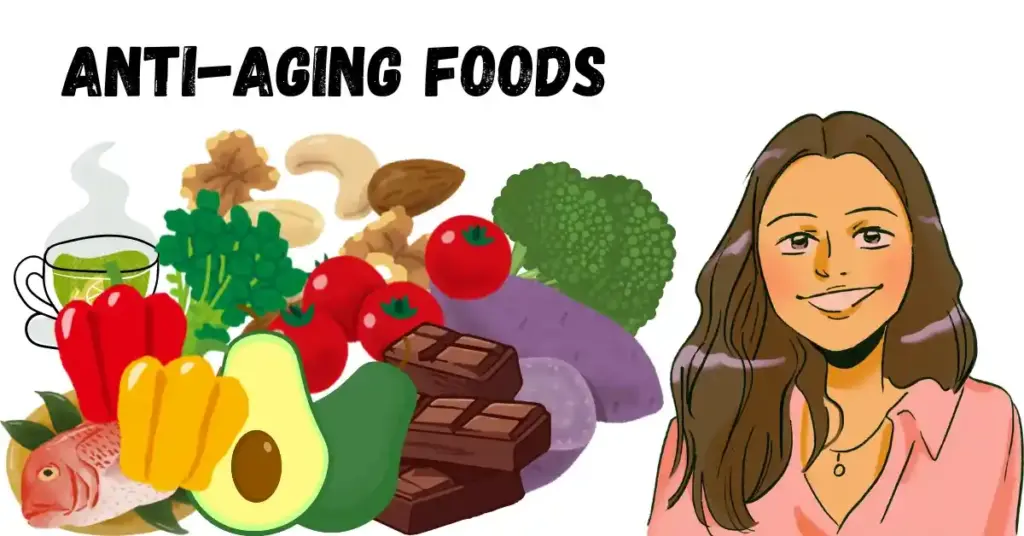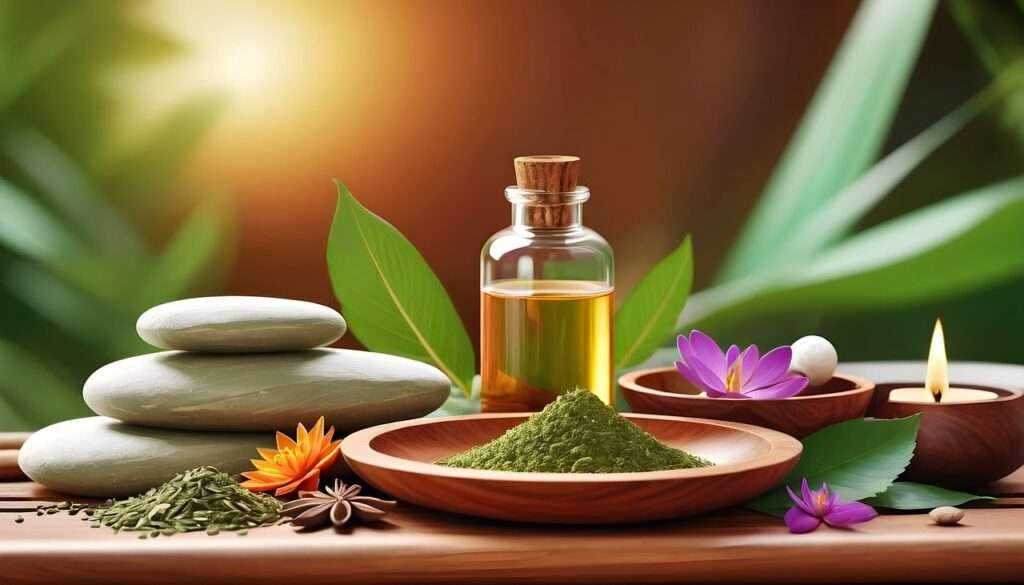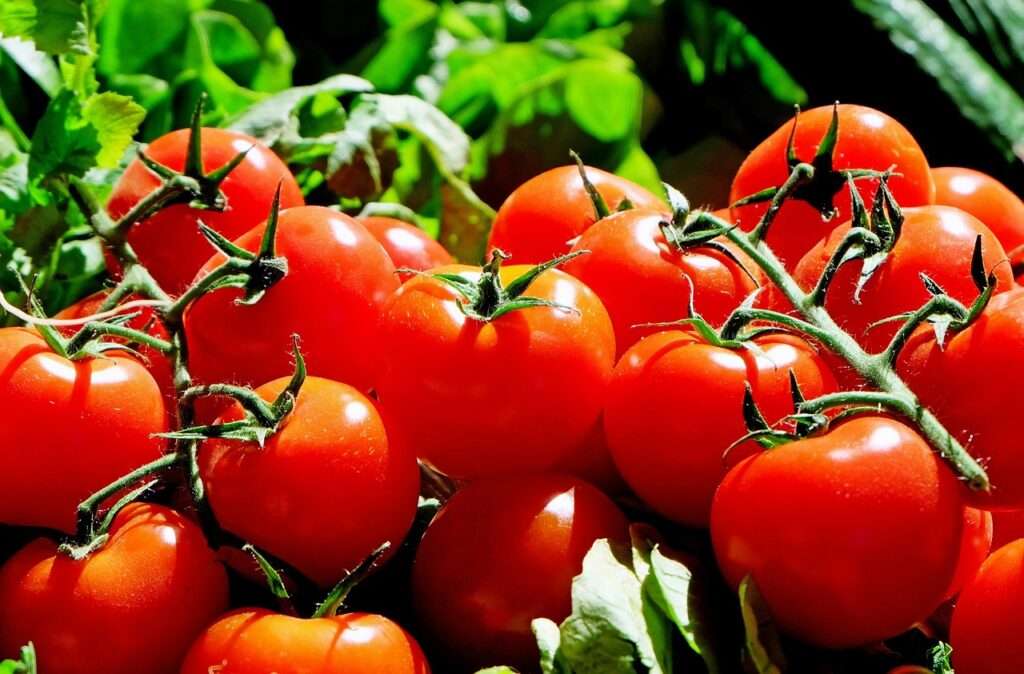10 Best Anti-Ageing Foods to Eat for Youthful and Radiant Skin
Introduction
Having youthful, glowing skin is a desire that many share. While genes play a role, our diet is equally crucial in achieving a fresh, radiant complexion. In this article, we’ll explore the top 10 anti-aging foods that can help you maintain youthful skin and discuss their incredible benefits. Remember, incorporating these nutrient-dense foods into your diet, along with a healthy lifestyle, is key to unlocking their full anti-aging potential for your skin.
Anti-Aging Foods
When it comes to preserving youthful skin, antioxidant-rich foods like berries, leafy greens, and nuts can be game-changers. They help combat the effects of aging by neutralizing free radicals that contribute to wrinkles and dullness. Foods high in omega-3 fatty acids, such as salmon and flaxseeds, can also work wonders. They promote hydration and reduce inflammation, two enemies of a youthful complexion.
Additionally, consuming foods rich in vitamins C and E, like citrus fruits and avocados, can protect your skin from damage caused by free radicals and UV radiation. The following is a list of 10 anti-aging foods that have been discussed extensively. These foods have been shown to be effective in maintaining a youthful appearance and promoting optimal health. We hope that this information proves to be useful to you and any external audience you may be sharing it with.
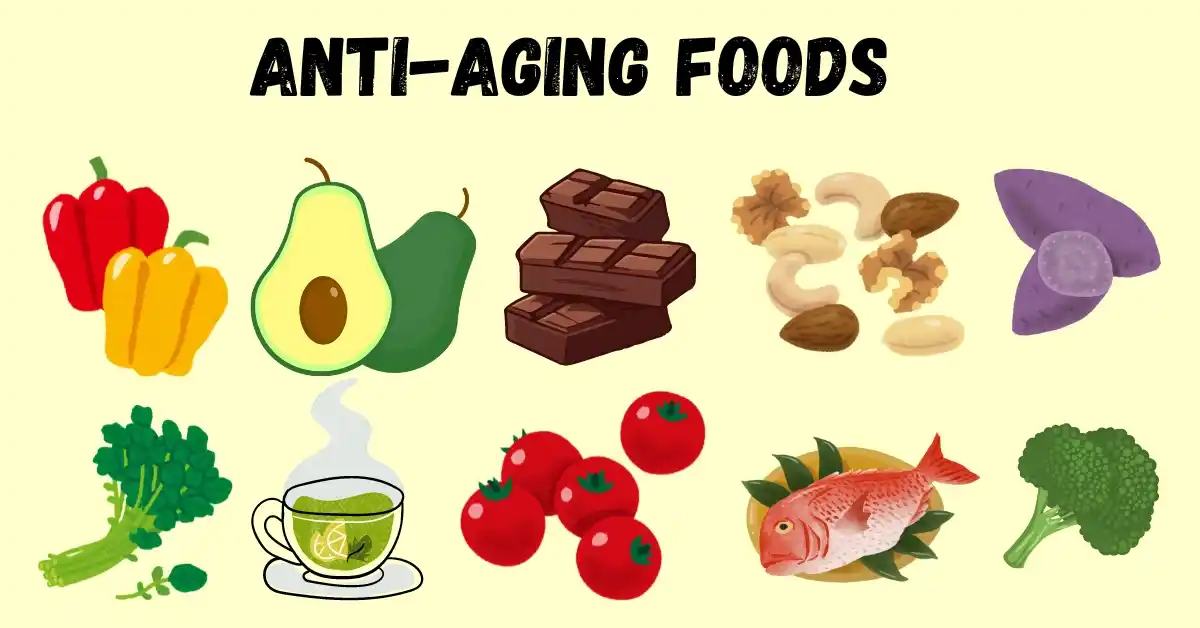
1. Red Bell Peppers
If you’re looking for a vibrant addition to your anti-aging skincare routine, look no further than red bell peppers. These vibrant veggies are packed with antioxidants, particularly vitamin C, which can help boost collagen production and protect your skin from environmental stressors. Red bell peppers also contain carotenoids, which give them their brilliant hue and act as powerful antioxidants, protecting your skin from sun damage and premature aging.
To reap the benefits of red bell peppers, try roasting them with a drizzle of olive oil and a sprinkle of sea salt for a delicious side dish or add them to omelets, salads, or stir-fries for a burst of color and nutrition.
2. Avocados
Avocados are a true superfood when it comes to promoting youthful skin. These creamy fruits are loaded with healthy monounsaturated fats that help keep your skin hydrated and supple. They’re also rich in vitamins C and E, which are essential for protecting your skin from oxidative stress and environmental damage.
One of the easiest ways to incorporate avocados into your diet is by making a simple avocado toast. Mash some ripe avocado onto whole-grain toast, add a sprinkle of sea salt and red pepper flakes, and enjoy a delicious and nutritious breakfast or snack.
3. Broccoli
Broccoli is a nutrient powerhouse that should be a staple in any anti-aging diet. This cruciferous veggie is packed with vitamin C, which is essential for collagen production and maintaining a youthful complexion. It’s also rich in vitamin K, which can help reduce inflammation and promote wound healing.
To get the most out of broccoli, try roasting it with a drizzle of olive oil and a sprinkle of garlic powder for a crispy, flavorful side dish. You can also add it to stir-fries, soups, or omelets for an extra nutritional boost.
4. Nuts
Nuts are a fantastic source of vitamin E, a powerful antioxidant that helps protect your skin from free radical damage and promotes skin repair. Almonds, walnuts, and hazelnuts are particularly rich in this skin-loving nutrient.
For a quick and healthy snack, try a handful of mixed nuts or make your own trail mix by combining your favorite nuts with dried fruit and a sprinkle of cinnamon or cocoa powder.
5. Dark Chocolate/Cocoa
Indulge your sweet tooth with a little dark chocolate or cocoa powder – your skin will thank you! Dark chocolate and cocoa are rich in antioxidants called flavanols, which can help protect your skin from sun damage and improve hydration and elasticity.
When choosing dark chocolate, look for bars with a high percentage of cocoa solids (at least 70%) to get the maximum anti-aging benefits. You can also add a tablespoon of unsweetened cocoa powder to your morning smoothie or oatmeal for a chocolate twist.
6. Fatty Fish
Fatty fish like salmon, mackerel, and sardines are excellent sources of omega-3 fatty acids, which are essential for maintaining youthful, supple skin. Omega-3s help keep your skin moisturized and reduce inflammation, which can contribute to premature aging.
Try to incorporate fatty fish in your diet at least twice a week. Try baking salmon with lemon and dill, or make a tasty tuna salad with olive oil and fresh herbs for a nutritious lunch option.
7. Sweet Potatoes
Sweet potatoes are a delicious and nutritious addition to any anti-aging diet. These vibrant tubers are packed with beta-carotene, a powerful antioxidant that your body converts into vitamin A. Vitamin A is essential for revitalizing damaged collagen, which is crucial for maintaining youthful, elastic skin.
Roast sweet potato wedges with a drizzle of olive oil and your favorite spices for a tasty side dish, or add some mashed sweet potato to your morning oatmeal or smoothie for a nutritional boost.
8. Green Tea
Green tea is a true anti-aging powerhouse, thanks to its high concentration of polyphenols, which are potent antioxidants. These compounds can help protect your skin from damage caused by free radicals and ultraviolet radiation, while also promoting collagen production and elasticity.
For maximum benefits, aim to drink 2-3 cups of green tea per day. You can enjoy it hot or iced, or even add a splash of lemon or honey for a refreshing twist.
9. Watercress
Don’t overlook the humble watercress – this leafy green is packed with vitamins and minerals that can do wonders for your skin. Watercress is an excellent source of vitamin C, which is essential for collagen production and protecting your skin from environmental stressors.
Watercress has a slightly peppery flavor that pairs well with salads, sandwiches, and even soups. Try sautéing it with garlic and olive oil for a delicious side dish or adding it to your morning omelet for an extra nutritional boost.
10. Tomatoes
Tomatoes are a must-have in any anti-aging diet, thanks to their high content of lycopene, a powerful antioxidant that gives them their vibrant red color. Lycopene can help protect your skin from sun damage and decrease wrinkle depth, making it an excellent ally in your quest for youthful, radiant skin.
For maximum lycopene benefits, opt for cooked tomatoes, as the cooking process increases the bioavailability of this antioxidant. Try making a fresh tomato sauce for pasta, or roasting cherry tomatoes with garlic and herbs for a flavorful side dish.
Incorporating Anti-Aging Foods into Your Diet
Incorporating these anti-aging superfoods into your diet doesn’t have to be complicated. Permit me to proffer a compendium of pragmatic recommendations, designed to facilitate the initiation of your endeavor:
- Plan ahead: Meal prepping can be a game-changer when it comes to incorporating nutrient-dense foods into your diet. Spend some time on the weekend chopping veggies, cooking grains, and prepping healthy snacks for the week ahead.
- Get creative with recipes: Experiment with new recipes that feature anti-aging ingredients like sweet potatoes, avocados, and leafy greens. You can find plenty of inspiration online or in cookbooks dedicated to healthy eating.
- Make smoothies your friend: Smoothies are a convenient way to pack in a variety of anti-aging nutrients in one delicious beverage. Try blending spinach, berries, avocado, and almond milk for a nutrient-dense breakfast or snack.
- Embrace meatless Mondays: Consider going meatless one day a week and focusing on plant-based meals that feature anti-aging ingredients like lentils, nuts, and leafy greens.
- Snack smarter: Instead of reaching for processed snacks, keep a stash of nuts, fresh fruit, and veggies with hummus on hand for when hunger strikes.
By making conscious choices and prioritizing nutrient-dense, anti-aging foods, you’ll be well on your way to achieving a youthful, radiant complexion from the inside out.

Anti-Aging Meal Plan Ideas
To help you get started on your anti-aging food journey, here are some meal plan ideas that feature the top 10 anti-aging foods we’ve discussed:
Day 1
- Breakfast: Start your day with a nutrient-dense smoothie. Blend together spinach, blueberries, Greek yogurt, chia seeds, and a touch of honey for a powerful antioxidant boost.
- Lunch: Enjoy a grilled salmon salad with mixed greens, avocado, cherry tomatoes, and a drizzle of balsamic vinaigrette. Salmon is rich in omega-3 fatty acids, which help reduce inflammation and support skin health.
- Dinner: Roast a medley of colorful vegetables, such as bell peppers, zucchini, and onions, and serve them over a bed of quinoa. Quinoa is a complete protein that also provides fiber, vitamins, and minerals.
Day 2
- Breakfast: Start your day with a veggie-packed omelet. Sauté spinach, mushrooms, and bell peppers, then fold them into a fluffy egg mixture. Top with a sprinkle of feta cheese for added flavor and calcium.
- Lunch: Grilled salmon salad with mixed greens, avocado, and balsamic vinaigrette. Lentils are a great source of plant-based protein, fiber, and antioxidants that can help fight aging.
- Dinner: Grill a lean protein, such as chicken or turkey, and serve it with roasted sweet potatoes and steamed broccoli. Sweet potatoes are rich in beta-carotene, which can help protect the skin from sun damage.
Day 3
- Breakfast: Enjoy a bowl of overnight oats made with rolled oats, almond milk, chia seeds, and a touch of cinnamon. Oats are a complex carbohydrate that can help regulate blood sugar levels and provide sustained energy.
- Lunch: Build a colorful salad with mixed greens, grilled shrimp, avocado, and a variety of fresh vegetables. Shrimp is a great source of selenium, a mineral that can help protect the skin from oxidative stress.
- Dinner: Bake a fillet of wild-caught cod and serve it with roasted Brussels sprouts and quinoa. Cod is a lean protein that’s rich in vitamin B12, which is essential for healthy skin, hair, and nails.
Day 4
- Breakfast: Start your day with a chia pudding made with chia seeds, almond milk, and a touch of honey. Chia seeds are packed with omega-3 fatty acids, fiber, and antioxidants.
- Lunch: Enjoy a grilled chicken and vegetable wrap, using whole-wheat tortillas or lettuce leaves as the base. Include a variety of crunchy veggies, such as carrots, bell peppers, and cucumbers.
- Dinner: Prepare a hearty vegetable stir-fry with tofu, broccoli, bell peppers, and mushrooms. Serve over a bed of brown rice for a fiber-rich, nutrient-dense meal.
Day 5
- Breakfast: Whole-grain toast with avocado and a side of mixed berries Layer plain Greek yogurt with fresh berries and a sprinkle of granola for a protein-packed, antioxidant-rich breakfast.
- Lunch: Build a nutrient-dense grain bowl with quinoa, roasted sweet potatoes, avocado, and a drizzle of tahini dressing.
- Dinner: Bake a fillet of wild-caught salmon and serve it with roasted asparagus and a side of brown rice. Salmon is a rich source of omega-3 fatty acids, which can help reduce inflammation and support skin health.
Day 6
- Breakfast: Enjoy a veggie-packed frittata with spinach, tomatoes, and a sprinkle of feta cheese. Frittatas are a great way to pack in a variety of nutrient-dense ingredients.
- Lunch: Grilled salmon salad with mixed greens, avocado, and balsamic vinaigrette. Lentils are a great source of plant-based protein, fiber, and antioxidants that can help fight aging.
- Dinner: Grill a lean protein, such as chicken or turkey, and serve it with roasted sweet potatoes and steamed broccoli. Sweet potatoes are rich in beta-carotene, which can help protect the skin from sun damage.
Day 7
- Breakfast: Start your day with a nutrient-dense smoothie. Blend together spinach, blueberries, Greek yogurt, chia seeds, and a touch of honey for a powerful antioxidant boost.
- Lunch: Build a colorful salad with mixed greens, grilled shrimp, avocado, and a variety of fresh vegetables. Shrimp is a great source of selenium, a mineral that can help protect the skin from oxidative stress.
- Dinner: Bake a fillet of wild-caught cod and serve it with roasted Brussels sprouts and quinoa. Cod is a lean protein that’s rich in vitamin B12, which is essential for healthy skin, hair, and nails.
Remember, the key is to focus on incorporating a variety of nutrient-dense, anti-aging foods into your meals and snacks. Don’t be afraid to get creative and experiment with different flavor combinations and recipes to keep things exciting and enjoyable.
By prioritizing these anti-aging superfoods and embracing a lifestyle that supports overall well-being, you’ll be well on your way to achieving a youthful, radiant complexion that glows from the inside out.
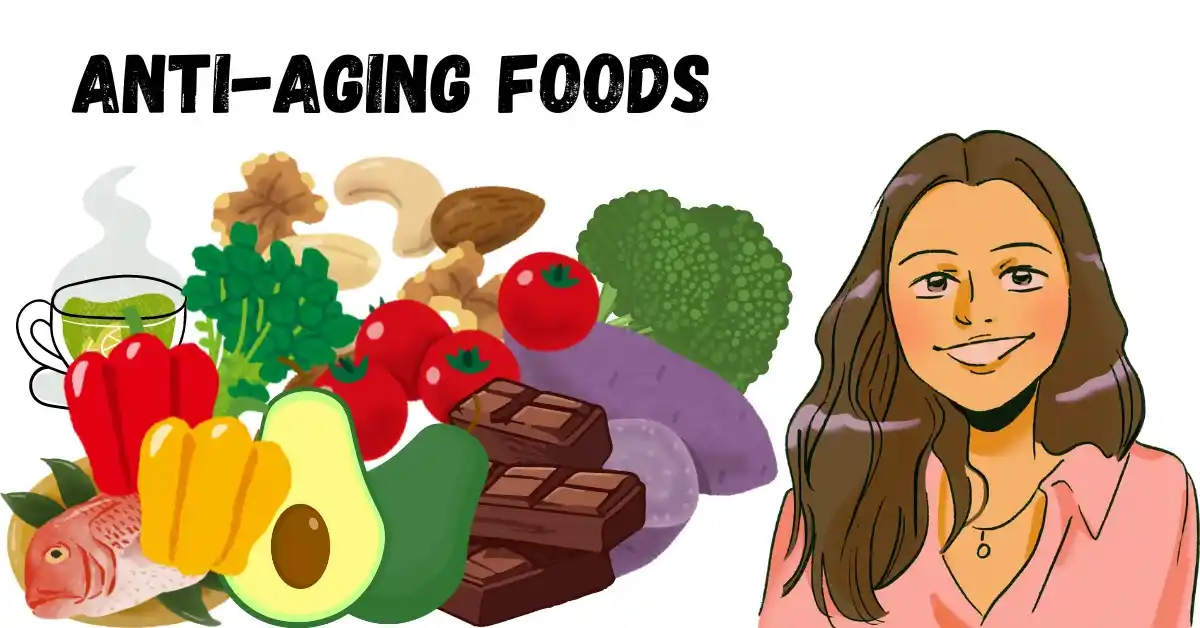
What Are Anti Ageing Foods
Skin health and collagen formation are critical to general well-being. Consuming foods high in important nutrients and antioxidants, such as broccoli, red bell peppers, spinach, blueberries, nuts and seeds, fatty fish, yogurt, whole grains, avocados, and green tea, can aid in skin health and collagen formation. Broccoli contains vitamin C, which is important for collagen synthesis, and lutein, which has been linked to better memory and brain function. Spinach, a superfood high in vitamins A, C, E, and K, promotes collagen formation and hair health. Blueberries include flavonoids, which protect skin from oxidative stress and may boost cognitive function. A well-balanced diet high in these nutrients will help you have healthier skin and feel better in general.
Anti Aging Foods Benefits
Anti-aging foods are vital for preserving skin, brain, and gut health. They are high in vitamins, minerals, and antioxidants, which boost skin health, decrease inflammation, improve heart health, and protect brain cells. Anti-inflammatory foods, such as fatty fish and turmeric, can help decrease inflammation and improve general health. Leafy greens like spinach, kale, and Swiss chard include critical elements for bone health. Probiotic-rich foods, such as yogurt and kefir, promote intestinal health. Green tea and avocado are examples of anti-aging foods that promote cellular repair and regeneration. A balanced diet, frequent exercise, and adequate water are essential for general health and longevity.
Create a meal plan around anti-aging principles
A healthy meal plan should include antioxidants, good fats, protein-rich meals, whole grains, and water, while limiting added sweets and processed foods. Leafy greens, berries, and bell peppers are great antioxidant sources. Aim for five portions of vegetables and fruits every day. Select low-calorie foods such chicken, turkey, seafood, tofu, and lentils.
Choose whole grains such as quinoa, brown rice, oats, and whole wheat bread to boost overall vitality and digestive health. Drink plenty of water and herbal teas to boost your antioxidants. Calcium, vitamin D, magnesium, and vitamin K are all beneficial to bone health. Spices and herbs such as turmeric, ginger, garlic, and cinnamon can improve flavor and health. Plan balanced meals with a range of food types, and pay attention to your body’s hunger and fullness cues.
Best supplements for anti-aging
Curcumin, a powerful antioxidant contained in turmeric, can help protect against cellular damage and postpone age-related disorders. Green tea contains EGCG (Epigallocatechin Gallate), which has been shown to improve mitochondrial activity and protect against aging skin and UV-induced hyperpigmentation. Collagen, which is necessary for skin suppleness, may be found in bone broth and other meals, and collagen supplements are also available. CoQ10, an antioxidant, promotes cellular energy generation and may help protect against oxidative stress.
NAD+ precursors, such as nicotinamide riboside (NR), can boost NAD+ levels and halt the aging process. Individual reactions might vary, therefore it is critical to see a healthcare expert before beginning any new supplements. Guidelines include starting with smaller dosages, evaluating body response, and contacting healthcare providers.
Vitamin and mineral supplements for anti-aging
Popular supplements, such as Multivitamin/Mineral (MVM) and Vitamin D, are essential for maintaining general health. These supplements can boost nutritional intake, enhance overall health, and lower the risk of certain illnesses. They may help to avoid birth abnormalities, improve bone health, and lower the risk of chronic diseases. To achieve the best outcomes, check with a healthcare practitioner and prioritize a well-balanced diet. Bone health depends on a variety of vitamins and minerals.
Conclusion
While consuming anti-aging foods can be a game-changer for maintaining youthful, radiant skin, it’s important to remember that a holistic approach is key. In addition to nourishing your body with nutrient-dense foods, prioritize self-care practices that support healthy aging from the inside out.
Create a regular skincare routine that includes gentle cleaning, moisturizing, and sunscreen. Aim for at least 7-8 hours of quality sleep each night, as sleep plays a crucial role in cellular repair and regeneration. Manage stress through practices like meditation, yoga, or simply taking time to engage in activities you enjoy.
Remember that genuine beauty radiates from inside. By fueling your body with anti-aging superfoods and embracing a lifestyle that supports overall well-being, you’ll be well on your way to achieving a youthful, glowing complexion that radiates confidence and vitality.
FAQs:
How do anti-aging foods help promote youthful skin?
Anti-aging foods are rich in nutrients like antioxidants, vitamins, minerals, and healthy fats that work together to combat the signs of aging skin. Antioxidants help neutralize free radicals that can cause oxidative stress and damage to skin cells, leading to premature wrinkles and age spots. Vitamins like C, E, and A support collagen production, which is essential for maintaining skin elasticity and firmness. Healthy fats like those found in avocados and fatty fish help keep skin hydrated and supple, while minerals like zinc and selenium aid in skin repair and renewal.
Can anti-aging foods replace skincare products?
While incorporating anti-aging foods into your diet is essential for promoting youthful skin, it's not a complete replacement for a good skincare routine. Anti-aging foods work from the inside out, providing your skin with the necessary nutrients to stay healthy and vibrant. However, topical skincare products like serums, moisturizers, and sunscreens work from the outside in, protecting your skin from environmental stressors and providing targeted treatment for specific skin concerns. For best results, combine a nutrient-rich diet with a consistent, high-quality skincare routine.
Can anti-aging foods help reverse existing signs of aging?
Anti-aging foods can help minimize and potentially reverse some signs of aging, but the extent of their effects depends on various factors. For example, foods rich in vitamin C can help reduce the appearance of fine lines and wrinkles by boosting collagen production, while those containing lycopene, like tomatoes, can help decrease the depth of existing wrinkles. However, more severe signs of aging, such as deep-set wrinkles or significant loss of elasticity, may require additional measures like professional treatments or skincare products.
Are there any specific foods that should be avoided for youthful skin?
While the focus should be on incorporating nutrient-dense, anti-aging foods into your diet, there are certain foods and substances that can accelerate the aging process and should be limited or avoided. Processed foods high in sugar and unhealthy fats can contribute to inflammation and oxidative stress, which can lead to premature aging of the skin. Excessive alcohol consumption can also dehydrate the skin and impair its ability to regenerate and heal. Additionally, smoking is a major contributor to premature aging, as it increases free radical production and damages collagen and elastin fibers in the skin.
Is it possible to get too much of certain anti-aging nutrients?
While it's generally recommended to consume a variety of anti-aging foods to obtain a balance of different nutrients, it is possible to consume excessive amounts of certain nutrients, which can have adverse effects. For example, excessive intake of vitamin A from sources like liver or supplements can lead to toxicity, causing symptoms like nausea, headaches, and even liver damage. Similarly, extremely high doses of antioxidants like vitamin E or beta-carotene from supplements may potentially increase the risk of certain health conditions. The key is to focus on obtaining these nutrients from whole, natural food sources and maintaining a balanced, varied diet.
